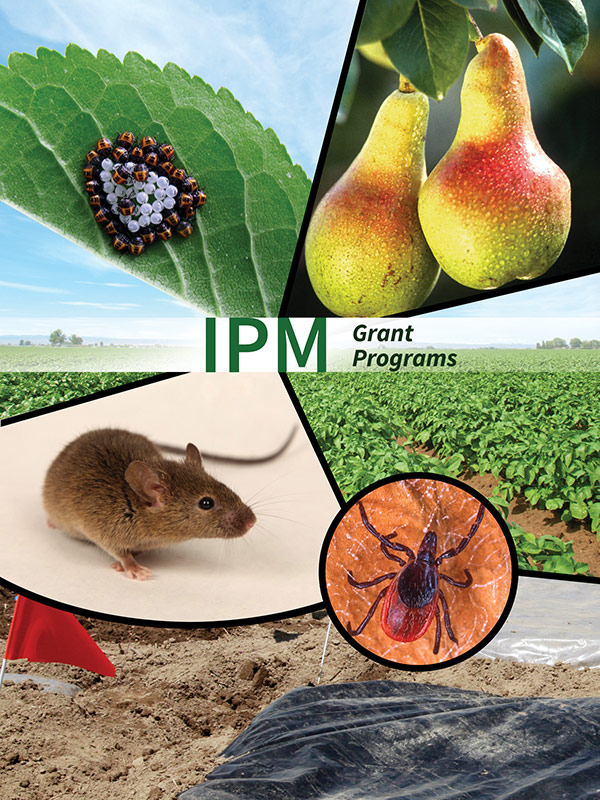Northeastern IPM Center Announces Recipients of 2024 Partnership Grants
 |
Annual grant program supports IPM research and extension in the Northeast
The Northeastern Integrated Pest Management (IPM) Center has announced the recipients of its 2024 Partnership Grants.
Each year, through a competitive request-for-applications (RFA) process, the Center’s IPM Partnership Grants Program distributes funding to projects that further the mission of the Center, address or identify IPM priorities for the Northeast, and benefit the region at large. The total pool of available funding for 2024 projects was $160,000, generally with a maximum of $40,000 per award.
Each funded project falls under one of three categories: applied research, communications, and working groups.
This Year’s Funded Projects by Category
Applied Research
- An Ecosystem Services Framework to Improve Economic and Environmental Outcomes of Cattle Pest Fly IPM (Bryony Sands, PhD | Postdoctoral Research Fellow | University of Vermont)
- Distribution and Frequency of Anticoagulant Rodenticide Resistance Among Commensal Rodents in the Northeastern U.S. (Changlu Wang, PhD | Extension Specialist in Entomology | Rutgers University)
Communications
- Protecting Endangered Species and Pollinators: Communicating Recent Changes in Pesticide Regulation (Niranjana Krishnan, PhD | Assistant Professor and Maryland Pesticide Safety Education Program Coordinator | University of Maryland)
Working Groups
- Continued Next-Generation Support for the Northeast Tree Fruit IPM Working Group (Terence Bradshaw, PhD | Associate Professor and Chair, Department of Plant and Soil Science | University of Vermont)
About the Projects
An Ecosystem Services Framework to Improve Economic and Environmental Outcomes of Cattle Pest Fly IPM
Flies are the most economically damaging insect pest of grazing cattle in the U.S., and grazing dairy producers constitute the largest agricultural sector in the Northeast. A growing number of dairy farms are organic or grass-fed and pasture their cattle for the grazing season, bringing new challenges for pest management with more cattle on pasture, limited treatment options for organic producers, and the threat of resistance.
This project will use a multistate survey, on-farm research, and a controlled field trial to gather data for an economic model based on an ecosystem services framework. Knowledge gained will identity widely relevant solutions and promote the development and adoption of pest fly IPM.
Continued Next-Generation Support for the Northeast Tree Fruit IPM Working Group
The New England and Mid-Atlantic states have long been one of the most significant tree fruit production areas in the U.S. A 2010 Northeastern IPM Center Partnership Grant facilitated the establishment of a Northeast Tree Fruit IPM Working Group, which has met annually. But retirements and other shifts in personnel have left next-generation specialists concerned about loss of institutional memory.
This project includes support for continued development of the working group and its annual meeting. Goals include further enhancing regional collaborations, updating IPM priorities and practices lists, transferring and preserving institutional knowledge, and coordinating research and extension projects.
Distribution and Frequency of Anticoagulant Rodenticide Resistance Among Commensal Rodents in the Northeastern U.S.
Commensal rodents are a common group of urban pests. Rodenticides are the primary control method, with the most used active ingredients being anticoagulants. The development of rodenticide resistance by global rodent populations is a concern that has been only sparsely researched, especially in the U.S.
This project will use genetic analysis of collected rodent samples to assess the prevalence of anticoagulant resistance, with a goal of reducing the use of less effective rodenticides and decreasing unintended impacts on predators and scavengers.
Protecting Endangered Species and Pollinators: Communicating Recent Changes in Pesticide Regulation
The EPA is starting to require measures to protect listed species and critical habitat under the Endangered Species Act (ESA), which will significantly alter how non-residential pesticides are applied. Growers and pesticide applicators are largely unaware of these changes due to lack of educational resources and trained extension educators. There is also limited awareness of how to participate in the EPA’s decision-making process and the tools needed to be compliant with ESA regulations.
This project will develop and distribute educational materials to increase stakeholder knowledge, regulatory compliance, adoption of IPM and conservation practices, and participation in the EPA's decision-making process.
About the Partnership Grants Program
The Center typically releases its annual Partnership Grants RFA sometime in the fall. Stay tuned for further details.
To receive Center news and announcements by signing up for our low-traffic e-mail list and following us on social media, visit www.northeastipm.org/about-us/contact/.
To learn more about the IPM Partnership Grants Program, visit neipmc.org/go/bfgs.
